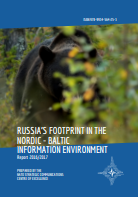RUSSIA’S COMPATRIOT POLICY IN THE NORDICBALTIC REGION
RUSSIA’S COMPATRIOT POLICY IN THE NORDICBALTIC REGION
Author(s): Ieva Bērziņa
Subject(s): Politics, Media studies, Geography, Regional studies, Communication studies, International relations/trade, Security and defense, Military policy
Published by: NATO Strategic Communications Centre of Excellence
Keywords: NB8; Nordic-Baltic Region; Russia; politics; compatrior policy; information; communication; diaspora;
Summary/Abstract: The overview of Russia’s grand strategy in relation to the NB8 region (Chapter 1) identified the ‘compatriot policy’ as one tool for achieving its political and military goals in the international arena. Russia, as the legal successor of the Soviet Union, claimed responsibility for compatriots of the former Soviet Union (not only ethnic Russians), many of whom became citizens (or non-citizens)64 of countries that regained their independence or were established as sovereign states after the collapse of the Soviet Union. These specific historical circumstances created a situation in which a large number of people that Russia considers compatriots reside outside its territorial borders. From the Kremlin’s perspective this gives it the moral and legal grounds to intervene in the internal matters of other sovereign states when justified by the need to protect and defend the rights of Russia’s (ex-Soviet) compatriots. Among the reasons given to justify the five day war with Georgia in 2008 and the annexation of the Crimea in 2014 was the need to protect compatriots, thus setting a precedent for Russia’s violating the territorial integrity and sovereignty of its neighbouring states on the principle of defending compatriots. This chapter provides some insight into how Russia is using its compatriot policy as a tool of influence in the NB8 region, with an outline of the Russian perspective regarding the protection of compatriots. We assess the possibility of using the compatriot policy as a justification for sovereignty violations in the NB8 region, as was done in Georgia and the Crimea. We used a comparative over- view of the compatriots’ main activities in 2016 to answer the research questions. The main conclusion is that due to their ethnic structure, the Baltic States, and Estonia and Latvia in particular, are most vulnerable to the application of narrative of a violation of compatriots’ rights. However, the mere existence of the narrative is not itself an indication of hostile action, because the protection of compatriots’ rights is a means rather than an end. Another conclusion is that Russia consolidates compatriots’ activities in different countries and uses this as a concerted channel for the global promotion of Russia’s worldview. In other words, over time Russia’s compatriot policy has exceeded the ‘Near Abroad’ (a specific term used in Russia’s political language to signify countries that once formed the Soviet Union, where Russia claims to have special interests). For the NB8 region, this means that some of the issues salient in the Baltic States for over two decades have gradually spread to other countries as well.
Book: RUSSIA’S FOOTPRINT IN THE NORDIC - BALTIC INFORMATION ENVIRONMENT
- Page Range: 31-56
- Page Count: 26
- Publication Year: 2018
- Language: English
- Content File-PDF

